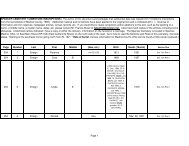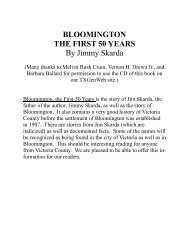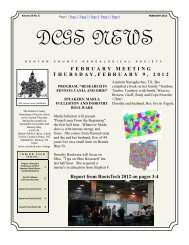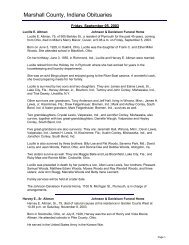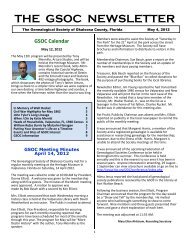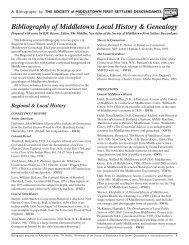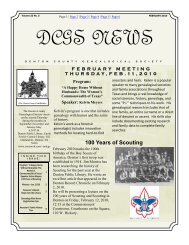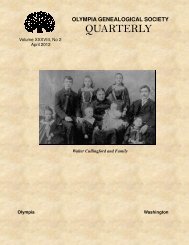Getting to the Roots of Your Family - RootsWeb - Ancestry.com
Getting to the Roots of Your Family - RootsWeb - Ancestry.com
Getting to the Roots of Your Family - RootsWeb - Ancestry.com
You also want an ePaper? Increase the reach of your titles
YUMPU automatically turns print PDFs into web optimized ePapers that Google loves.
Petty Petty Constable<br />
Constable<br />
The petty constable worked under <strong>the</strong> high constable <strong>of</strong> <strong>the</strong> county <strong>to</strong> keep <strong>the</strong> peace in <strong>the</strong><br />
parish although Tate states that “In many places <strong>the</strong> duties, and <strong>the</strong>refore <strong>the</strong> accounts <strong>of</strong><br />
constables, wardens and overseers, were mixed <strong>to</strong>ge<strong>the</strong>r in a condition <strong>of</strong> indescribable<br />
confusion.” 19<br />
The Constable’s primary duty “was <strong>to</strong> take charge <strong>of</strong> arrangements for keeping watch and<br />
ward in <strong>the</strong> parish.” 20<br />
He was <strong>to</strong> “apprehend any person who had <strong>com</strong>mitted a felony, but<br />
also if he saw any minor <strong>of</strong>fence <strong>com</strong>mitted, or even a breach <strong>of</strong> <strong>the</strong> peace about <strong>to</strong> take<br />
place, <strong>to</strong> apprehend <strong>the</strong> <strong>of</strong>fender.” 21<br />
He could hold “petty sessions” (or court) in his own parish and was <strong>of</strong>ten required <strong>to</strong> attend<br />
quarter sessions for <strong>the</strong> county. This job was <strong>the</strong> “most objected <strong>to</strong>” and “ei<strong>the</strong>r abandoned<br />
<strong>to</strong> humble folk, attracted by its perquisites, or else invariably filled by a substitute.” 22<br />
He also<br />
assisted <strong>the</strong> county in raising a militia. In some places in England, he was allowed <strong>to</strong> levy a<br />
“Constable’s Rate” for his expenses. It’s also possible his expenses came from poor<br />
accounts when dealing with vagrancy or even <strong>the</strong> churchwarden’s accounts depending on<br />
local practice.<br />
Lastly, he had <strong>the</strong> duty <strong>of</strong> providing and maintaining <strong>the</strong> parish butts (for archery), s<strong>to</strong>cks<br />
and whipping post and taking charge <strong>of</strong> <strong>the</strong> parish armor.<br />
Records for which primarily responsible<br />
Constables Orders and Constables Rates<br />
FINDING FINDING THE THE RECORDS<br />
RECORDS<br />
• Search <strong>the</strong> <strong>Family</strong> His<strong>to</strong>ry Library Catalog for your parish and check for <strong>the</strong> subjects<br />
<strong>of</strong> “poor law” and also “church records”<br />
• Search <strong>the</strong> <strong>Family</strong> His<strong>to</strong>ry Library Catalog for <strong>the</strong> county in which your parish is<br />
found for a guide <strong>to</strong> existing parish records<br />
• Search <strong>the</strong> catalog <strong>of</strong> <strong>the</strong> relevant county record <strong>of</strong>fice online for <strong>the</strong> parish and<br />
possible deposited records<br />
• Search “Access2Archives” at www.nationalarchives.gov.uk<br />
Remember <strong>to</strong> search all available records for a parish because <strong>the</strong> roles and records are not<br />
usually clearly defined.<br />
19 Tate. Page 179.<br />
20 ibid. Page 179.<br />
21 Webb. Page 26.<br />
22 ibid. Page 18.



